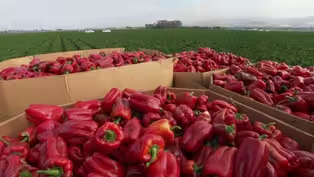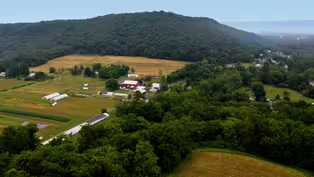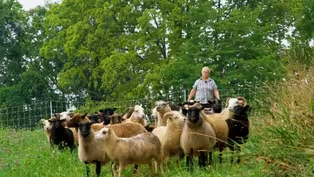
Exotic Mushroom Varieties
Clip: 6/30/2023 | 6m 2sVideo has Closed Captions
A mushroom farm near Monterey Bay grows unique varieties.
A mushroom farm near Monterey Bay grows unique varieties like Lion’s Mane and Cauliflower mushrooms. Far West Fungi is family-owned, reaching customers at more than a dozen farmers markets throughout Northern California. Many shoppers are attracted to the exotic mushroom varieties seldom found elsewhere.
Problems playing video? | Closed Captioning Feedback
Problems playing video? | Closed Captioning Feedback
America's Heartland is presented by your local public television station.
Funding for America’s Heartland is provided by US Soy, Sustainable Agriculture Research and Education, Rural Development Partners, and a Specialty Crop Grant from the California Department of Food and Agriculture.

Exotic Mushroom Varieties
Clip: 6/30/2023 | 6m 2sVideo has Closed Captions
A mushroom farm near Monterey Bay grows unique varieties like Lion’s Mane and Cauliflower mushrooms. Far West Fungi is family-owned, reaching customers at more than a dozen farmers markets throughout Northern California. Many shoppers are attracted to the exotic mushroom varieties seldom found elsewhere.
Problems playing video? | Closed Captioning Feedback
How to Watch America's Heartland
America's Heartland is available to stream on pbs.org and the free PBS App, available on iPhone, Apple TV, Android TV, Android smartphones, Amazon Fire TV, Amazon Fire Tablet, Roku, Samsung Smart TV, and Vizio.
Providing Support for PBS.org
Learn Moreabout PBS online sponsorship♪♪ Now, this may look like lobster, but it's not.
And this cauliflower?
Well, it's not cauliflower, but a mushroom called Lion's Mane.
Lion's Mane is really cool for kind of, like, imitating meat.
So, you can kind of cut really thick slices of it and almost do, like, a crab cake out of it.
Some people will bread them up and fry them.
So, you get this, like, nice crispy texture on it.
The distinctive looking Lobster and Lions Mane are just two of the organic, exotic mushroom varieties that customers can find at the Far West Fungi Café in Santa Cruz, California.
[Ian Garrone] They're usually, um, just really intrigued with the variety that we bring in.
Maybe the only thing they've ever had is a... is a white button mushroom that came in a can and how much they dislike those mushrooms.
And then, when they come to our shop, they realize, well, it's not the only thing that is available.
We do have some, uh, new merchandise that's going to be coming in.
It looks like, uh, on... online sales have been really good... Ian Garrone oversees operations for Far West Fungi's Santa Cruz store and the company's outlet in San Francisco's Ferry Building.
The family-run agricultural operation- with Ian, his parents and three brothers- also provides online sales and reaches consumers directly at more than a dozen farmers markets in Northern California.
Many shoppers are attracted to the exotic mushroom varieties seldom found elsewhere.
♪♪ [Ian] Well, they love the product.
You know, usually they say, "I haven't...
I haven't been able to find this for years," or, you know, "This was a mushroom that I only found in my native country," whether it be the Philippines or, you know, Russia.
Ian's parents, John and Toby Garrone, began the business in the 1980s.
John came from a farming background.
Living in San Francisco, the couple began growing mushrooms in a warehouse as a sideline to John's full-time job.
[John] When I started working in the mushroom business, um, I was still a member of the communications staff of the San Francisco Police Department.
And so, basically, I was, uh, dispatching police cars at night, and then selling mushrooms in the morning.
Far West raises their organic, exotic mushroom varieties at two locations south of San Jose in California's coastal area.
The majority are raised here in an extensive warehouse complex near Moss Landing.
[Kyle Garrone] So, you can actually grow mushrooms anywhere, um, all over the world because you're basically having mushroom houses that are temperature and humidity controlled.
Ian's brother, Kyle Garrone, handles operations here, a complex process involving detailed steps unlike other types of agricultural production.
That's because mushrooms are their own organism- neither plant nor animal.
Mushrooms draw nutrients from their environment and don't need sunlight to flourish.
[Kyle] So, it's very different than any type- other type of agricultural product.
Um, it's somewhere in between, like, farming and science, um, and somewhat like a factory, because you're producing it in large volumes in big warehouses.
♪♪ Far West grows their fungi in organic hardwood sawdust.
After an aging fermentation period, nutrients are added to supplement the sawdust and the combination moves through a mixing machine to be packed into large bags.
From there, these bags of hardwood growing material called "substrate" are off to be sterilized in large boiler-like ovens called autoclaves.
[Kyle] And so, we will sterilize them at 121 Celsius or 250 degrees Fahrenheit, um, for about four hours to eliminate all the life in the material.
From there, the bags go to a "clean room," where the substrate is inoculated with something called mycelium, different strains of which determine the dozen plus exotic varieties of mushrooms raised here.
[Kyle] So, we'll be adding that to our bags and then we seal the bag.
And so, we're basically sealing the fungus within its food source in a sterile environment.
So, it's basically, you have your fungus with its food without any competition, and that will allow that mushroom to grow and develop without having any issues of different diseases coming into- to our substrate.
The bags of inoculated substrate are stored in dark humid environments where the mushrooms, sprouting from the substrate, are harvested by hand.
Far West will process more than 20,000 bags a week.
From the beginning, farmers markets have been key to the family's success, as customers looking to expand their food horizons sampled and purchased new varieties.
[Toby] Farmers markets are really important.
I find that people are a lot more adventurous than I think they would be in the grocery store.
I think that we were so lucky as to when we started and just... just the movement of food and fresh food, organic food, uh, healthy food has- You know, we just came into it by luck at the right time.
Ian Garrone hopes his young daughters can someday carry on this farming family tradition, a tradition that he says uses everyone's talents to the best advantage.
[Kyle] So, we have our- all our strengths, uh, you know, kind of covered, um, but everyone does different things.
And I think that really helps, um, allow us to kind of grow in our own areas, and then also can support each other.
♪♪ Take your pick!
There are several thousand varieties of mushrooms growing in the United States, but only a few hundred are thought to be safely edible.
And a word about Toadstools: The word was once used interchangeably by some cultures in identifying certain mushrooms.
Today, the word toadstool is often used to describe examples of poisonous mushrooms.
Video has Closed Captions
Clip: 6/30/2023 | 6m 20s | Visit a bustling farm in California’s Central Valley as they harvest bell peppers. (6m 20s)
Video has Closed Captions
Preview: 6/30/2023 | 30s | Get ready for an all-new season of America’s Heartland premiering July 1! (30s)
Sustainable Agriculture in Pennsylvania
Video has Closed Captions
Clip: 6/30/2023 | 5m | Meet the women who own a rural farm in Pennsylvania. (5m)
Wild Mushroom Galette – Farm to Fork with Sharon Profis
Video has Closed Captions
Clip: 6/30/2023 | 5m 33s | Discover how to prepare a Wild Mushroom Galette with chimichurri sauce. (5m 33s)
Providing Support for PBS.org
Learn Moreabout PBS online sponsorshipSupport for PBS provided by:
America's Heartland is presented by your local public television station.
Funding for America’s Heartland is provided by US Soy, Sustainable Agriculture Research and Education, Rural Development Partners, and a Specialty Crop Grant from the California Department of Food and Agriculture.



















